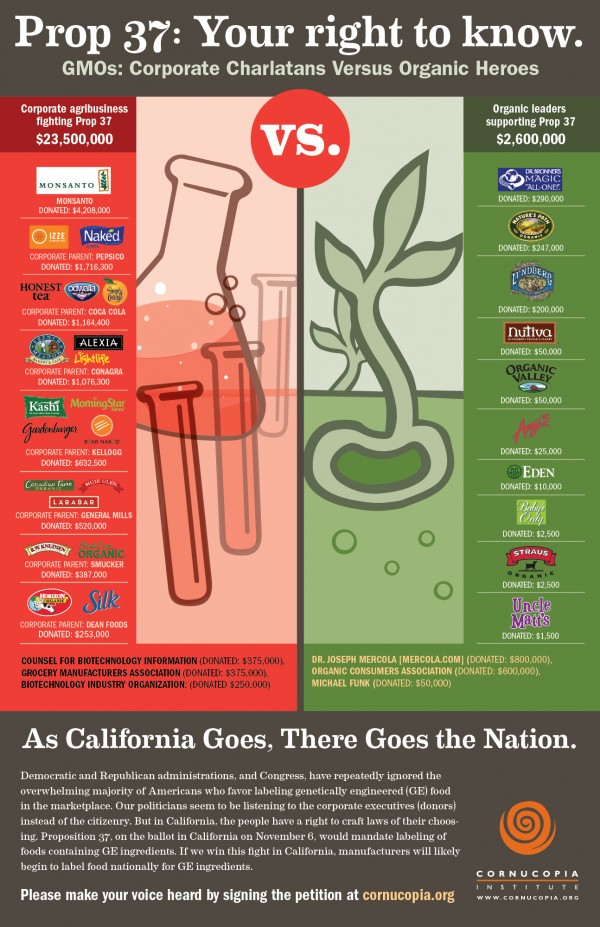Do you buy products from?
- Silk
- Kashi
- Horizon
- Knudsen
- Cascadian Farm
- Santa Cruz Organic
- Muir Glen
- Odwalla
- Honest Tea
- Bear Naked
- Gardenburger
- Morning Star
- Larabar
- Naked
- Izze
You’ll find at least three of these labels in my cupboard, and shamefully, I have reviewed and promoted products by many of these companies. I am sorry.
Do you support GMO labeling? The above companies DO NOT! Why? Shockingly, yet not surprising, the parent companies of many organic labels have contributed money to defeat California’s Proposition 37: Right to Know Label Genetically Engineered Food.
- Coca Cola
- Con Agra
- General Mills
- Kellogg
- Dean Foods
- Smucker
- Pepsico
These are big businesses that care nothing about your right to know what is in your food. Of course, the largest contributor of over $4.2 million is the evil Monsanto, but I expect that. The natural and organic companies have betrayed my trust.
The Cornucopia Institute explains how disproportionate campaign contributions have been regarding this important proposition:
Recent polling indicates almost 70% of citizens support informational labeling. And a flood of new contributions to fight the measure has rolled in from the biotechnology industry and food manufacturers, totaling over $23 million, according to the California Secretary of State. This dwarfs the approximately $3 million contributed by proponents of GE labeling.
“Consumers might be surprised to find out that brands hiding under ‘natural’ façades are in fact owned by multi-billion-dollar corporations that are contributing bushel baskets of cash to defeating Proposition 37,” says Charlotte Vallaeys, Director of Farm and Food Policy at The Cornucopia Institute…
Another example is Silk soymilk, which carries the “Non-GMO Project Verified” seal on its products but is owned by the nation’s largest dairy, Dean Foods, which has contributed $253,000 to the effort to kill Prop. 37. Dean Foods also owns the Horizon Organic brand. Both Silk and Horizon profess to consumers that the brands oppose GMOs.
“Talk is cheap,” adds Vallaeys. “Consumers should not only know whether there are GMOs in their food, but also whether their hard-earned dollars are supporting companies that then turn around and invest those profits in the effort to sell-out their right to know.”
The Cornucopia Institute, which developed the funding guide, stresses that the organization is not against corporate involvement in organics.
I will no longer support the above companies. I will try to remember and research before writing a product review.
Please vote YES on Prop 37 in November!

Great graphic – didn’t realize so many supposed friendlies are in support of GMOs.
Perhaps they support reason. I have yet to hear a reason for GE warning labels that had evidence to back it up.
I purposefully do not buy products that certify themselves as non-GMO because this seems to play to people’s fears through their wallets. Craft foods are fine, but it crosses the line for me to promote an agenda that dilutes mandatory nutritional and safety warnings.
If people want to reduce their environmental impact or balance their diet, stop eating so much meat. Silly labels are just a cop out.
We are seeing a rise in gluten intolerance and celiac’s disease due to crossbreeding of wheat in the 1950s. What will we find out 60 years from now about GE crops? What sorts of serious allergies and intolerances will develop?
There is nothing in this law that dilutes the current labeling of nutritional and safety information, so I am not sure what you are referring too.
This law is called “Right to Know” because many of us want to know. If you do not, that is your personal choice. Organic food is exempt from the law, as to be certified, you cannot use GMO seeds.
I don’t think this proposition, at its bare bones level, is so much about how wrong GMOs are, but rather more about our right as consumers to know what’s in our food. We simply want to be more educated in the choices we make, especially when it comes to what we put in our bodies. How can their be anything wrong with that?
Well said!